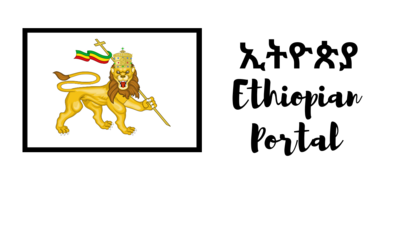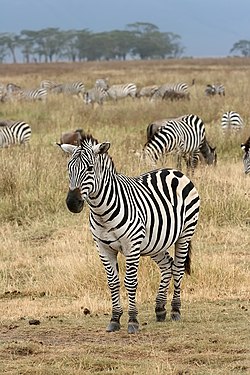Portal:Ethiopia
Introduction
Federal Democratic Republic of Ethiopia የኢትዮጵያ ፌደራላዊ ዴሞክራሲያዊ ሪፐብሊክ (Amharic) | |
|---|---|
| Anthem: ወደፊት ገስግሺ ፣ ውድ እናት ኢትዮጵያ (English: "March Forward, Dear Mother Ethiopia") | |
 | |
| ISO 3166 code | ET |
Ethiopia, officially the Federal Democratic Republic of Ethiopia, is a landlocked country located in the Horn of Africa region of East Africa. It shares borders with Eritrea to the north, Djibouti to the northeast, Somalia to the Northeast, East and Southeast, Kenya to the South, South Sudan to the West, and Sudan to the Northwest. Ethiopia covers a land area of 1,112,000 square kilometres (472,000 sq. miles). , it is home to around 128 million inhabitants, making it the 13th-most populous country in the world, the 2nd-most populous in Africa after Nigeria, and the most populated landlocked country on Earth. The national capital and largest city, Addis Ababa, lies several kilometres west of the East African Rift that splits the country into the African and Somali tectonic plates.
Anatomically modern humans emerged from modern-day Ethiopia and set out for the Near East and elsewhere in the Middle Paleolithic period. Southwestern Ethiopia has been proposed as a possible homeland of the Afroasiatic language family. In 980 BC, the Kingdom of D'mt extended its realm over Eritrea and the northern region of Ethiopia, while the Kingdom of Aksum maintained a unified civilization in the region for 900 years. Christianity was embraced by the kingdom in 330, and Islam arrived by the first Hijra in 615. After the collapse of Aksum in 960, the Zagwe dynasty ruled the north-central parts of Ethiopia until being overthrown by Yekuno Amlak in 1270, inaugurating the Ethiopian Empire and the Solomonic dynasty, claimed descent from the biblical Solomon and Queen of Sheba under their son Menelik I. By the 14th century, the empire had grown in prestige through territorial expansion and fighting against adjacent territories; most notably, the Ethiopian–Adal War (1529–1543) contributed to fragmentation of the empire, which ultimately fell under a decentralization known as Zemene Mesafint in the mid-18th century. Emperor Tewodros II ended Zemene Mesafint at the beginning of his reign in 1855, marking the reunification and modernization of Ethiopia. (Full article...)
Selected article -
KMG Ethiopia, also known as Kembatti Mentti Gezzima-Tope (Kembatta Women Standing Together), is an indigenous non-governmental charitable organization based in Kembata, Ethiopia, dedicated to protecting women's rights, fostering women's health and supporting the environment. Founded in 1997 by sisters Bogaletch and Fikirte Gebre, the organization has expanded across the nation.
KMG Ethiopia works to foster change through social revolution and practical assistance, rather than through legislation. 2013's Making Citizens in Africa: Ethnicity, Gender, and National Identity in Ethiopia describes the work of KMG as "groundbreaking and culturally respectful", demonstrating "that reform for women and girls must be inclusive of women and men, it must include traditional power structures, and it will be most successful when it also integrates with anti-poverty and development initiatives." The organization has successfully deployed the "community conversations" technique pioneered by AIDS activist Moustapha Gueye to foster social change in a number of key areas related to the wellbeing of women and girls, including combating female genital mutilation and bridal abduction, and has assisted the Ethiopian government nationally with HIV prevention initiatives. It also works towards providing health care, including creating the Mother and Child Health Centre in Durame, and building schools. It has initiatives engineered at improving life through the environment by providing potable water, sustainable electricity and planting trees. (Full article...)Selected biography -

Lij Seifu Mikael (Amharic: ልጅ ሰይፉ ሚካኤል, Säyfu Mikāēl, also Sayfu Mikael, Seifu Michael; 14 January 1898 – 23 September 1958) was an Ethiopian noble, member of the Solomonic dynasty, belonging to the aristocratic Amhara family from Ankober Shewa. He was the grandson of Dejazmatch Mekuria Tesfaye of Menz, a prominent general, a cousin of Emperor Menelik II of Ethiopia, and grandson of King Sahle Selassie of Shewa. Lij Seifu, a public figure, was educated in Paris at the Sorbonne. He was one of the first few earlier members of the royalty who started paying salaries to their household servants advocating freedom of slaves and an avid supporter of Ras Tafari in his bid to become an emperor of Ethiopia. He served as Ethiopia's minister to France and Germany while he lived in Europe in the 1910s, Ethiopia's Consul General to Eritrea from 1921 to 1925 and Governor of several districts till the eve of the fascist invasion of Ethiopia.
During the time Ethiopia was preparing for the war against Mussolini's invasion of Ethiopia, Lij Seifu's company that sold ammunition and weapons to the Ethiopian Empire supplied the majority of rifles and ammunition to the government and the private armies of the nobility without payment to defend the sovereignty of his nation. After Ethiopia's independence from fascist occupation, he was appointed by the emperor to modernize and manage the government's most lucrative business establishments like the coffee plantations in Arsi and Harerge. He also served as chief administrator of the Ethiopia Orthodox Church overseeing the establishment of the Church's real estate interests to bolster the Church's income and modernize the secular administration of the Church. As one of the wealthiest Ethiopians of the time, some of the real estate establishments of the Church were personally funded from his private funds. (Full article...)General images -
Related portals
Geography
Countries
WikiProjects
Main WikiProject
Related WikiProjects
Africa • Countries • Eritrea • African military history task force
Things you can do
- Visit the Ethiopian Wikipedians' notice board.
- The noticeboard is the central forum for information and discussion on editing related to Ethiopia.
- Comment at the Ethiopian deletion sorting page.
- This page lists deletion discussions on topics relating to Ethiopia
Selected pictures
Did you know -

- ... that medieval Ethiopian kings claimed to be descended from Solomon?
- ... that Quintin Johnstone advocated giving control of an American-governed law school to native Ethiopians?
- ... that Aguil Chut-Deng took 22 child refugees from South Sudan to Ethiopia during civil war so that they could attend school?
- ... that the government of Ethiopia's SNNP Region supported local governments calling for a referendum to secede from the region?
- ... that Liberian paramount chief Tamba Taylor worked as a tailor and claimed to have sewn clothes for Ethiopian emperor Haile Selassie and Ghanaian president Kwame Nkrumah?
- ... that Tsadkan Gebretensae, one of the top commanders of Tigray forces in the conflict against the Ethiopian government, previously served as chief of staff of the Ethiopian National Defense Force?
In the news
Categories
Topics
Other Ethiopia-connected Wikipedias
Wikimedia
The following Wikimedia Foundation sister projects provide more on this subject:
-
Commons
Free media repository -
Wikibooks
Free textbooks and manuals -
Wikidata
Free knowledge base -
Wikinews
Free-content news -
Wikiquote
Collection of quotations -
Wikisource
Free-content library -
Wikiversity
Free learning tools -
Wikivoyage
Free travel guide -
Wiktionary
Dictionary and thesaurus
Other portals





































































